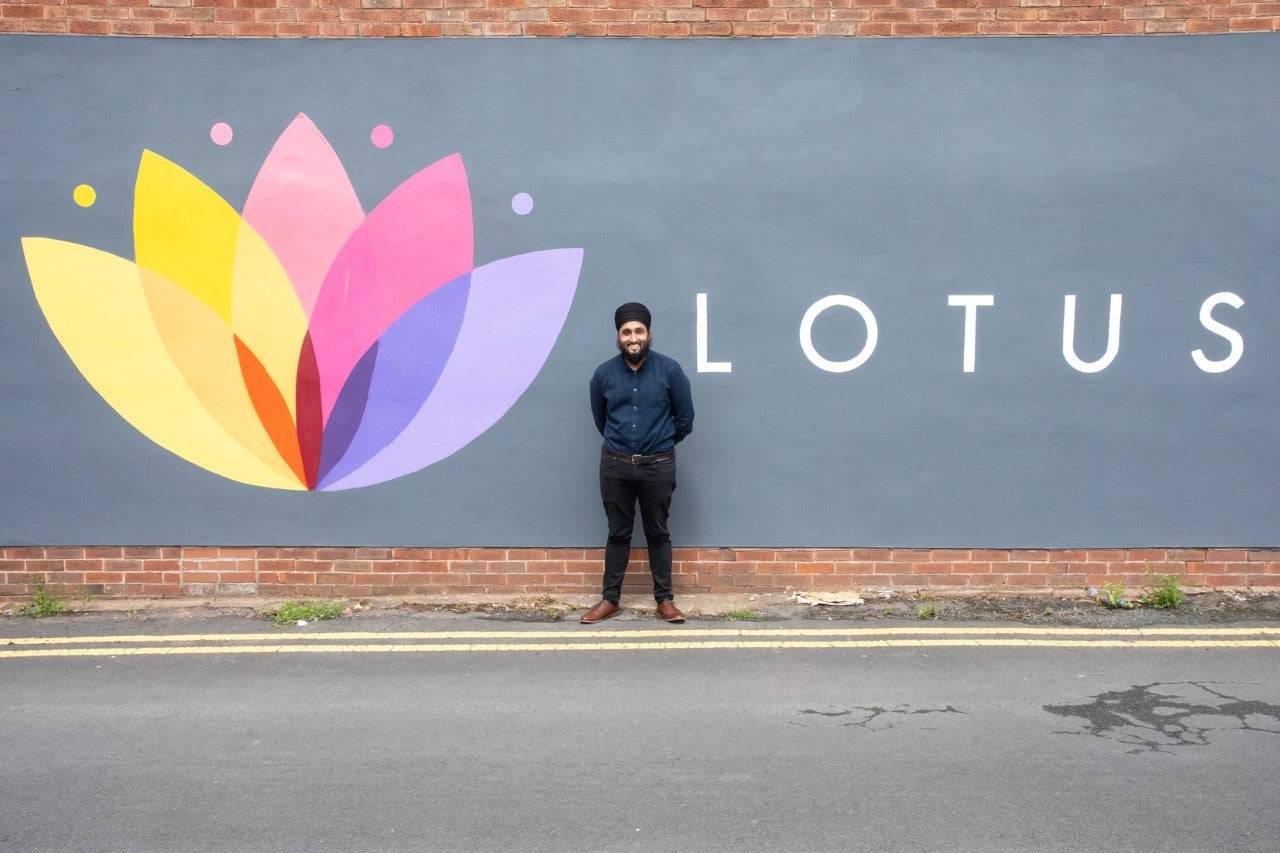How Lotus Sanctuary is giving the homeless a home
After years in the property business, Gurpaal Singh Judge decided he needed some soul in his work. He tells Heather Martin about the Lotus Sanctuary and its self-imposed mission to solve homelessness


Lotus Sanctuary’s self-imposed mission is to solve homelessness and Gurpaal Singh Judge, chief executive of the community interest company, says: “It’s in the word... if you’re homeless, what you need is a home. A cup of coffee and a conversation is nice but a home is better.”
Gurpaal is not one to put off until tomorrow what can be done today. One morning he turned up at work to find a woman sleeping rough outside the Lotus head office in Wolverhampton and by the night-time she was in a home of her own. The place was hers for two years if she needed it.
It was pure chance she’d ended up on his doorstep. It was two other women who had inspired him to act in the first place.
Gurpaal was working in property management as a lettings agent, dealing with landlords and investors, but he, “hated the nine to five… I wanted to bring some soul into my job”.
So in the hope of balancing things out he began volunteering at a local night shelter, working a 12-hour shift from 8pm to 8am before readying the premises for the next influx of guests. He says: “I was trying to do something other than live in a corporate world.”
But 2018 was a bad year and life was getting him down. To dig himself out of a dark hole he went on a week-long break at a Buddhist retreat in Devon. For five days he heard not a single human voice. On the sixth day he went for a walk, brain blessedly switched off and phone once again switched on. Which was when he picked up a message from one of his fellow volunteers who relayed a story about a woman at the shelter who was on the streets, homeless and pregnant, and another in hospital who couldn’t get into a refuge until she’d been sober for six weeks and couldn’t because she couldn’t get into a refuge. “There was no recourse for either of them,” he says.
“You’re in property,” the recorded message urged him. “If anyone can do something about it, you can.”
The seed was sown. “When I woke up on day seven, the idea to do Lotus Sanctuary was in my head. Within a month I’d quit my job and within another we’d taken on our first two houses.” He was 24.
“I never had a calling until I had a calling,” he says. “Until I latched on to something, I had nothing to latch on to.”
The lotus grows in mud and it flowers on the surface of lakes and rivers and ponds. Our residents come out of adversity. We can’t ever know their struggle
At school, although not bad he had lacked focus and couldn’t sit still and unlike his three older brothers, left when he was 16. His father had been a buy-to-let landlord, eventually retiring to live off the proceeds, so property was in the blood as was the Sikh sense of duty and service. “My mum is a very caring person. We grew up around people doing that bit more,” he says.
Gurpaal’s approach is non-judgemental and non-denominational. “We’re an open organisation,” he says, “a family”. His first mentor was the managing director of Christian charity Hope Into Action, who gave him the basic tools but the business model, tied to a specific religion and dependent on church property, was “not scaleable” and scaleability was a big part of the vision.
Lotus grew by 800 per cent last year. It employs 40 staff at head office and 60 community support workers. It has 1,800 beds in 250 properties nationwide, from single dwellings to blocks of 50 apartments. Gurpaal aspires to have 10,000 beds by 2023.
But surely his goal should be to bring those numbers down, rather than push them up? Providing a home is merely a first step, he explains – an emergency response. Eventually, he aims to repurpose the beds as move-on accommodation but for that he needs “strong funding partners and a good balance sheet”. With 10,000 beds and a projected £130m turnover, the sky is the limit.
He says: “We have the ambition of having such a war chest of money that we can build our own houses. Not only that: our residents will be the ones who are building those houses.”
Gurpaal says the landlords he works with are “socially conscious”, from a similar background, and: “They’ve got these investment vehicles they want to use not only to make money but also to do good. They fit our ethics well.”
Often they’d been stung by past tenants and welcomed the Lotus deal of a fixed income guaranteed over five years. He says: “We lease at market rent and claim enhanced housing benefit and the surplus pays for on-going support of residents, property maintenance and overheads.”
Only 10 per cent of his current portfolio is with private landlords. The bulk is large-scale private institutions and real-estate investment trusts. “We wouldn’t have been able to scale up without that,” he says. “In one day we went from 40 to 140, when a pension fund purchased us 100 units of accommodation.”
Gurpaal describes his model as private-sector funding for acquisitions, mixed with public-sector funding for support.
He says: “Combating houselessness is an issue in itself, with a shortage of housing in the UK. However, homelessness is something we are only starting to realise is a deeper issue that sits within the hearts and minds of our residents. More than an issue of bricks and mortar, it’s an issue of trust and trauma. A house isn’t always a home.”
Gurpaal believes that during the first lockdown, the government proved that if the will is there, rough sleeping can be ended overnight. And whereas he estimates that a homeless person costs the NHS roughly £25,000 a year, a Lotus home costs a modest £10,000.

All accommodation is furnished and Gurpaal insists that all mothers with children should live in self-contained accommodation, with no shared facilities. Women fleeing domestic violence account for a shocking 50 per cent of Lotus residents (Gurpaal believes demand since the 2010 austerity measures has increased by 20 per cent). The rest are rough sleepers or prison leavers. The referral lines are always busy.
The average length of stay is 18 months, during which residents receive tailored support. For a while, Gurpaal sought out corporate partnerships as a source of employment but found take-up too slow and he took matters into his own hands once again, launching retail division Lotus Living with a warehouse and two shops in Wolverhampton selling secondhand goods, thereby providing employment for residents while making money to reinvest. His aspiration is to have a warehouse and five shops in each of the regions in which it has properties by 2024.
His parents are proud of what Gurpaal has created, though at first they counselled against. It wasn’t any lack of confidence in his ability but the stigma attached to homelessness itself.
He says: “They didn’t know about homeless people because they’d never met a homeless person. They thought the homeless people were going to come in and trash the houses.”
Were they ever proved right? “Of course,” he says, philosophically. “Sometimes the houses get trashed.” But he refuses to be put off. He just sets about organising repairs. “That’s why we exist, because we want to give everyone a chance.”
Now his mother is a volunteer and one of his brothers is employed as finance director.
“It’s in the name,” Gurpaal explains. “The lotus grows in mud and it flowers on the surface of lakes and rivers and ponds. Our residents come out of adversity. We can’t ever know their struggle. What we see is the end product, the blossoming on the water.”
Gurpaal dreams of scaling up in order to scale down. He wants to keep on growing until everyone has a home and a living. Then, like his father, he can retire. “My ambition is to work myself out of a job.”
Join our commenting forum
Join thought-provoking conversations, follow other Independent readers and see their replies
Comments



Bookmark popover
Removed from bookmarks